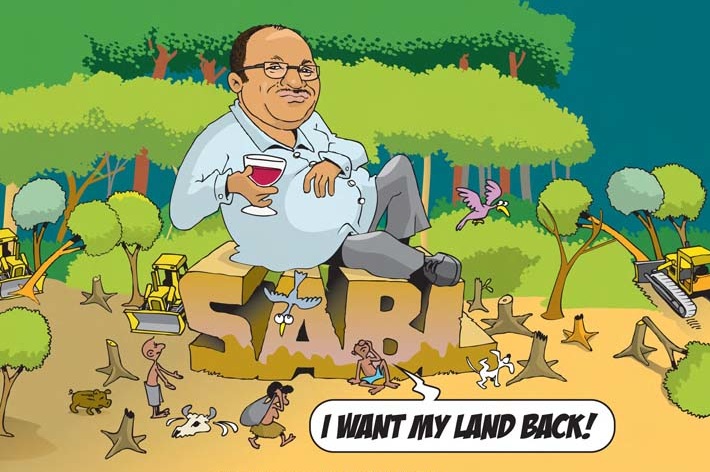
The Papua New Guinea government is seeking to use changes to the Land Act to retrospectively endorse a huge illegal land grab covering about 12% of the whole country. Despite the government promoting its new Bill as a move to clean up the administration of land and tackle corruption it will actually have the opposite effect, legitimising and compounding previous illegal acts and depriving a very large number of customary landowners of justice.
Between 2003 and 2011 the Department of Lands issued seventy-seven Special Purpose Business and Agriculture Leases covering more than 5.2 million hectares. In 2013, a government initiated Commission of Inquiry found these leases were illegal and recommended they be cancelled and the land returned to its customary owners. But rather than follow the Commission recommendation and declare the leases void, the Department of Lands has drafted legislation that will endorse the illegal ‘SABL’ leases and allow them to remain in effect for their full 99-year terms.
The government and Department of Lands are promoting the new Bill as a move to clean up the administration of land and tackle endemic corruption but, while one section of the Amendment Bill will remove the SABL concept and prevent any new leases being issued in the future, the government is remaining very quiet about its attempt to retrospectively give its stamp of approval to the existing illegal leases.
The idea of an SABL leases was originally created as a legal mechanism to allow small agriculture plantations on customary land, but the SABLs issued from 2003 far exceeded in size what could ever be used for genuine agriculture purposes. Worse still, most landowners were never consulted over the loss of their land and did not give their consent, despite their rights supposedly being protected in the Constitution.
A Commission of Inquiry was set up in 2011 in response to the widespread outcry from indigenous landowners, scientists and civil society at the theft of customary land. The Commission of Inquiry uncovered a catalogue of abuses in the process of developing the SABL leases, including a complete failure to obtain the consent of customary landowners or protect their interests in the terms of the contracts. The Commission also uncovered fraud, political interference and a total failure to follow proper processes. It was alleged many of the leases had been issued to facilitate large-scale logging operations, not genuine agriculture projects. The Commission recommended almost all the leases be cancelled and the land returned to its customary owners.
The SABL leases have also been condemned by the international community. The United Nations Committee on the Elimination of Racial Discrimination has twice written ‘please explain’ letters to the PNG government over the human rights impacts of the leases on rural communities. There has been similar concern expressed by the United Nations Special Rapporteurs on the Rights of Indigenous People, the Right to Food, the Right to Safe drinking Water and the Human Rights Council Working Group on transnational corporations and other business enterprises.
Although the PNG government has not even acknowledged the concerns raised by any of these international groups and has not replied to any of their correspondence, since 2013 the Prime Minister, Peter O’Neill, has made repeated public promises that the government will implement the Commission recommendations, cancel the leases and return the land to its customary owners.
While O’Neill has claimed the implementation of those promises have been blocked by the ‘bureaucracy’, it now appears his government is instead set on a very different path.
If approved by Parliament the proposed amendments to the Land Act will give a seal of approval to the illegal land grab and cement the unlawful alienation of customary land. With the government controlling over 100 of 111 seats in the national Parliament, Parliament's endorsement seems inevitable.
- ACTNOW's blog
- Log in to post comments
